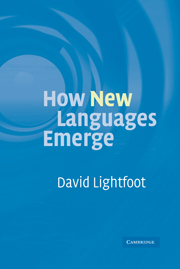Book contents
- Frontmatter
- Contents
- Preface
- 1 Internal languages and the outside world
- 2 Traditional language change
- 3 Some properties of language organs
- 4 Languages emerging in children
- 5 New E-language cuing new I-languages
- 6 The use and variation of grammars
- 7 The eruption of new grammars
- 8 A new historical linguistics
- References
- Index
2 - Traditional language change
Published online by Cambridge University Press: 02 February 2010
- Frontmatter
- Contents
- Preface
- 1 Internal languages and the outside world
- 2 Traditional language change
- 3 Some properties of language organs
- 4 Languages emerging in children
- 5 New E-language cuing new I-languages
- 6 The use and variation of grammars
- 7 The eruption of new grammars
- 8 A new historical linguistics
- References
- Index
Summary
Introduction
I should elaborate on the skepticism about languages like English and Dutch, which are undefinable and at best rough and ready notions. In general, an individual either has some grammatical property or not. Ella Fitzgerald pointed out that some say tomeyto and some say tomahto, and the word is different for different people. Some people might say something like Who did Kim say that visited Baghdad? and others might not. There are problems of observation: sometimes a person might agree that some sentence type is part of their competence, while at other times denying it, and we are not good observers of our own speech. Nonetheless, in principle, we will either observe somebody with a certain property or not, with some gray areas. But that is demonstrably not so of an external language like English.
A person brought up in Tennessee might say Kim might could sing that song but a person brought up in Polperro, Cornwall, would not speak that way (with what linguists call a “double modal”). Our Cornishman might ask if she is happy by saying Bin her happy?, but not our Tennesseean. You might agree that our Tennesseean and our Cornishman are both speakers of English and indeed they might communicate with a significant degree of success, but what does this discrepancy mean for “English”? Are Kim might could sing that song and Bin her happy? sentences of English, or not?
- Type
- Chapter
- Information
- How New Languages Emerge , pp. 17 - 39Publisher: Cambridge University PressPrint publication year: 2006
- 2
- Cited by

